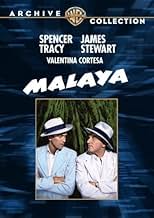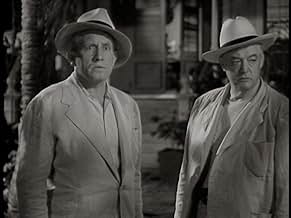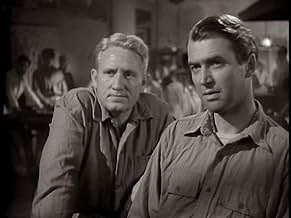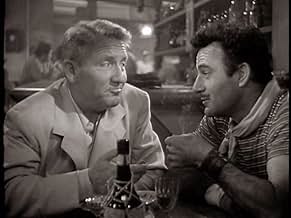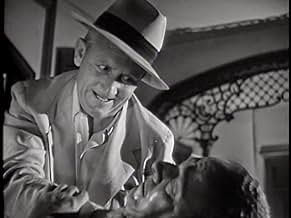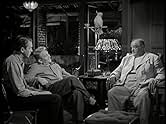IMDb RATING
6.5/10
1.6K
YOUR RATING
Newspaperman Royer convinces government officials of a plan to obtain rubber by smuggling it out from under the Japanese. Carnahan is let out of prison to help.Newspaperman Royer convinces government officials of a plan to obtain rubber by smuggling it out from under the Japanese. Carnahan is let out of prison to help.Newspaperman Royer convinces government officials of a plan to obtain rubber by smuggling it out from under the Japanese. Carnahan is let out of prison to help.
- Director
- Writers
- Stars
- Awards
- 2 wins total
Valentina Cortese
- Luana
- (as Valentina Cortesa)
Lester Matthews
- Matisson
- (scenes deleted)
Joel Allen
- Federal Agent
- (uncredited)
Besmark Auelua
- Henchman
- (uncredited)
George M. Carleton
- Small Businessman
- (uncredited)
Silan Chan
- Malay Girl
- (uncredited)
Spencer Chan
- Chinese Shipmaster
- (uncredited)
Joseph Crehan
- Businessman with Pipe
- (uncredited)
- Director
- Writers
- All cast & crew
- Production, box office & more at IMDbPro
Featured reviews
I'm an American ex-pat living in Malaysia, so I thought I'd watch this to see if there were any old scenes of life in Malaysia in the late 40's. Well, as I expected, there weren't, BUT the actual movie and story were really well done and interesting.
I thought the dialog in this movie was the best I have heard from this era. I watch a lot of "noir", and this dialog was more realistic with a flair that wasn't overdone. For example, the interaction between Spencer Tracy and his girl wasn't flowery or sappy, it was kind of hip and snappy without being too "40's". Also, every line out of Greenstreet's mouth was sublime.
Casting was awesome! It seemed like everybody was perfect for their role. Greenstreet was fantastic as an almost omnipotent bar owner. Tracy was rough and rugged. Stewart was convincing as a sort-of-drifter that finally finds purpose in his life. Plus, you get a cameo of Lionel Barrymore, which is worth it's weight in gold.
This is a "feel good" movie about losers and dregs of society helping to win the war. It's tough, violent, and not everybody gets out alive. And, it's patriotic without being sappy. Watch this one on the Fourth of July, and you can't go wrong!
I thought the dialog in this movie was the best I have heard from this era. I watch a lot of "noir", and this dialog was more realistic with a flair that wasn't overdone. For example, the interaction between Spencer Tracy and his girl wasn't flowery or sappy, it was kind of hip and snappy without being too "40's". Also, every line out of Greenstreet's mouth was sublime.
Casting was awesome! It seemed like everybody was perfect for their role. Greenstreet was fantastic as an almost omnipotent bar owner. Tracy was rough and rugged. Stewart was convincing as a sort-of-drifter that finally finds purpose in his life. Plus, you get a cameo of Lionel Barrymore, which is worth it's weight in gold.
This is a "feel good" movie about losers and dregs of society helping to win the war. It's tough, violent, and not everybody gets out alive. And, it's patriotic without being sappy. Watch this one on the Fourth of July, and you can't go wrong!
Malaya (1949)
It would be nice to love this movie—with a strong theme of wartime ingenuity and bravery, and with three stellar actors—but by the end I was thinking everyone involved was just going through the motions. That's probably enough in many ways with people this naturally gifted on screen, and the movie is enjoyable, no question. With all the borrowings or references to earlier classics (Sydney Greenstreet even has a big bird as a pet, as in "Casablanca"), it makes for a fun time.
The premise starts with some very compact storytelling—a somewhat disreputable man (James Stewart) is overheard saying he could smuggle rubber out of British Malaya (now Malaysia). It's WWII and the Army likes the idea enough to send him off with an ex-con (Spencer Tracy) who knows the area well. (This is all arranged with the help of Lionel Barrymore in a small role.)
Then the adventure begins as they penetrate with surprising ease the rubber plantations and arrange with the generally friendly locals and ex-pats to get their hidden stockpiles. The Japanese do eventually catch on and there is fun there, but not before a couple of torch songs and some humorous excess as usual from the likable Greenstreet.
Frankly, things never get exciting or even suspenseful, though interesting all along. One huge problem (for me) was a complete lack of details. The two men would say, okay, let's go get this rubber here, and they meet the plantation owner and there is some talk and then suddenly they are going down the river with some little barges. The Japanese have no suspicions, and the local smugglers are all these cheerful Resistance Fighter types who really like to help a lot.
It would be fun to know if a young viewer finds this exotic and fun or laughable. It's somewhere between in all. And what honestly holds it together for anyone who likes the actors is just watching familiar faces in new roles. That is one of the endless interests of the movies.
See it? Sure, if you already like older films or WWII films. It's not bad. The director Richard Thorpe is quite unknown these days, but the cinematographer is a standard bearer of he period, George Folsey, and that makes every scenes look terrific. Yeah, it's not at all bad. But it ain't great, either.
It would be nice to love this movie—with a strong theme of wartime ingenuity and bravery, and with three stellar actors—but by the end I was thinking everyone involved was just going through the motions. That's probably enough in many ways with people this naturally gifted on screen, and the movie is enjoyable, no question. With all the borrowings or references to earlier classics (Sydney Greenstreet even has a big bird as a pet, as in "Casablanca"), it makes for a fun time.
The premise starts with some very compact storytelling—a somewhat disreputable man (James Stewart) is overheard saying he could smuggle rubber out of British Malaya (now Malaysia). It's WWII and the Army likes the idea enough to send him off with an ex-con (Spencer Tracy) who knows the area well. (This is all arranged with the help of Lionel Barrymore in a small role.)
Then the adventure begins as they penetrate with surprising ease the rubber plantations and arrange with the generally friendly locals and ex-pats to get their hidden stockpiles. The Japanese do eventually catch on and there is fun there, but not before a couple of torch songs and some humorous excess as usual from the likable Greenstreet.
Frankly, things never get exciting or even suspenseful, though interesting all along. One huge problem (for me) was a complete lack of details. The two men would say, okay, let's go get this rubber here, and they meet the plantation owner and there is some talk and then suddenly they are going down the river with some little barges. The Japanese have no suspicions, and the local smugglers are all these cheerful Resistance Fighter types who really like to help a lot.
It would be fun to know if a young viewer finds this exotic and fun or laughable. It's somewhere between in all. And what honestly holds it together for anyone who likes the actors is just watching familiar faces in new roles. That is one of the endless interests of the movies.
See it? Sure, if you already like older films or WWII films. It's not bad. The director Richard Thorpe is quite unknown these days, but the cinematographer is a standard bearer of he period, George Folsey, and that makes every scenes look terrific. Yeah, it's not at all bad. But it ain't great, either.
Malaya may seem a fantastic tale, but the story actually has quite a bit of truth to it. When World War II broke out the Japanese quickly conquered most of the rubber producing areas of the world. The modern mechanized army does run on rubber and both the USA and Germany developed types of synthetic rubber to be used.
My mother told me during World War II there were all kinds of drives for recyclable material and among the most valuable was rubber. People contributed all kinds of old tires for the war effort.
Lionel Barrymore plays the real life Manchester Boddy who was publisher of the Los Angeles Daily News who was the prime mover in the scheme you see portrayed here in Malaya. Though this story is fictional, the need for rubber in the USA was critical at the time and there was in fact a rubber smuggling operation going on.
Spencer Tracy before he came to MGM played just the kind of two fisted action heroes at Fox which was his original studio. He expressed an interest in doing this kind of film for old time sake and got cast in it. He really isn't poaching on Humphrey Bogart's territory these were the kind of roles he originally did in film while Bogey was playing hoods over at Warner Brothers.
Because the script called for a buddy team of heroes, James Stewart was approached and he even conceded top billing to Tracy. According to the Films of James Stewart, he admired Tracy as an actor so much that he was grateful just for the opportunity to work with him again. In fact Stewart's first film role was in Murder Man, a film that starred Spencer Tracy back in 1935.
With the two of these big stars in the leads, MGM was able to recruit a really outstanding group of players like John Hodiak, Valentina Cortese, Roland Winters, Richard Loo, the aforementioned Lionel Barrymore and my two favorites Gilbert Roland and Sydney Greenstreet.
Roland was shortchanged though. Watching Malaya I could tell his role as Tracy's adventurous friend was left on the cutting room floor. But even a little Gilbert Roland is always a pleasure to watch.
This was Sydney Greenstreet's last film and in it he essentially reprises the part of Ferrari in Casablanca. He's got the best lines in the film and his scenes with his cockatoo are classic. As he says, he's just a saloon keeper with an access to gossip. Which gets put to very good use.
Stewart the idealist, Tracy the cynical realist. Too bad they didn't work together more.
My mother told me during World War II there were all kinds of drives for recyclable material and among the most valuable was rubber. People contributed all kinds of old tires for the war effort.
Lionel Barrymore plays the real life Manchester Boddy who was publisher of the Los Angeles Daily News who was the prime mover in the scheme you see portrayed here in Malaya. Though this story is fictional, the need for rubber in the USA was critical at the time and there was in fact a rubber smuggling operation going on.
Spencer Tracy before he came to MGM played just the kind of two fisted action heroes at Fox which was his original studio. He expressed an interest in doing this kind of film for old time sake and got cast in it. He really isn't poaching on Humphrey Bogart's territory these were the kind of roles he originally did in film while Bogey was playing hoods over at Warner Brothers.
Because the script called for a buddy team of heroes, James Stewart was approached and he even conceded top billing to Tracy. According to the Films of James Stewart, he admired Tracy as an actor so much that he was grateful just for the opportunity to work with him again. In fact Stewart's first film role was in Murder Man, a film that starred Spencer Tracy back in 1935.
With the two of these big stars in the leads, MGM was able to recruit a really outstanding group of players like John Hodiak, Valentina Cortese, Roland Winters, Richard Loo, the aforementioned Lionel Barrymore and my two favorites Gilbert Roland and Sydney Greenstreet.
Roland was shortchanged though. Watching Malaya I could tell his role as Tracy's adventurous friend was left on the cutting room floor. But even a little Gilbert Roland is always a pleasure to watch.
This was Sydney Greenstreet's last film and in it he essentially reprises the part of Ferrari in Casablanca. He's got the best lines in the film and his scenes with his cockatoo are classic. As he says, he's just a saloon keeper with an access to gossip. Which gets put to very good use.
Stewart the idealist, Tracy the cynical realist. Too bad they didn't work together more.
There is a scene that makes the whole picture worthwhile (although it is otherwise pretty ordinary):
Sydney GREENSTREET is entering a room after app. 2/3 of the movie, where Spencery Tracey has just been "treated kindly" in an "interview", Greenstreet is sweating (as always), sitting down and looking at the molestor of Tracy, then says (roughly): "If you say this was necessary, then of course it was necessary, but wasn't that much for a bottle of poor booze?". The officer say: "But he broke our rules". Greenstreet: "A man who drinks and then doesn't break any rules is no man. Drinking and making troubles goes together, this is also a rule." What a line !! Officer: "I love your logic." Of course these are not exactly the lines from the picture, cause I saw the German dubbed version and re-translated them, but they can only be better in the English version.
Hilarious! Tape it, when shown on TV next time and get to that scene, it is just great!
Sydney GREENSTREET is entering a room after app. 2/3 of the movie, where Spencery Tracey has just been "treated kindly" in an "interview", Greenstreet is sweating (as always), sitting down and looking at the molestor of Tracy, then says (roughly): "If you say this was necessary, then of course it was necessary, but wasn't that much for a bottle of poor booze?". The officer say: "But he broke our rules". Greenstreet: "A man who drinks and then doesn't break any rules is no man. Drinking and making troubles goes together, this is also a rule." What a line !! Officer: "I love your logic." Of course these are not exactly the lines from the picture, cause I saw the German dubbed version and re-translated them, but they can only be better in the English version.
Hilarious! Tape it, when shown on TV next time and get to that scene, it is just great!
Just by chance I was home to catch this terrific movie when it was shown a few days ago on cable TV...what a happy surprise! Both Stewart and Tracy play "good-bad guys" whose inner morality and patriotism rises to the top when the going gets tough. The supporting cast is full of top talent, including super performances from John Hodiak, Sidney Greenstreet, and Lionel Barrymore. Richard Loo and Gilbert Roland both play brilliantly to their "type" and are fine as well, and Roland Winters (usually in pompous comic roles) is very effective as a German rubber plantation owner who should not be trusted! Look for the always-welcome Russel Hicks in the scene on the train, and savor the sound of his elegant voice.
In addition, the script by Frank Fenton is way above average, with very droll and off-hand wit in evidence throughout.
All in all, a first-rate movie which deserves to be much better known!
In addition, the script by Frank Fenton is way above average, with very droll and off-hand wit in evidence throughout.
All in all, a first-rate movie which deserves to be much better known!
Did you know
- TriviaSydney Greenstreet's final film.
- GoofsOne scene features wild chimpanzees. Chimps are natives of Africa, not Malaya.
- Quotes
John Royer: You have to remember, this guy's a German.
Carnaghan: Yeah, but he's a greedy man, and greed has a nationality all its own.
- ConnectionsEdited from Les sacrifiés (1945)
- SoundtracksBlue Moon
(uncredited)
Written by Richard Rodgers and Lorenz Hart
Performed by Valentina Cortese (as 'Luana'), also whistled by James Stewart
- How long is Malaya?Powered by Alexa
Details
Box office
- Budget
- $2,396,000 (estimated)
- Runtime1 hour 38 minutes
- Color
- Aspect ratio
- 1.37 : 1
Contribute to this page
Suggest an edit or add missing content

